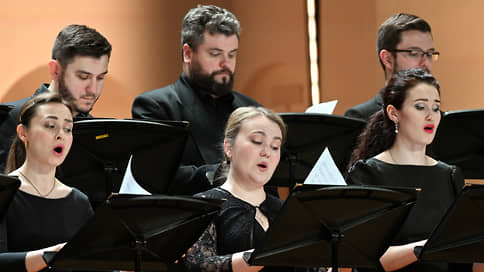On the wind of faith – Kommersant
[ad_1]

A new subscription cycle with a bilingual title “Musica sacra nova. Sacred Music from the Former USSR”, created with the participation of the Nikolai Karetnikov Foundation, opened in the Tchaikovsky Hall with a mosaic of works from 1967–1997 performed by the Intrada vocal ensemble. How old musical experiments sound today on the newly topical topic of spiritual resistance to officialdom, tells Yulia Bederova.
“When the wind rises, all the windmills turn as one. But there is another wind: the Spirit that drives peoples and tribes before it…” — with lines from a poem by Paul Claudel, the poet Olga Sedakova begins a conversation about artistic and spiritual resistance in Soviet and post-Soviet art on the pages of the booklet to the “Musica sacra nova” series. “It is difficult to say exactly when this “other wind” arose: probably in the late 1950s. He rose in the country of victorious — as it was then believed, finally and irrevocably victorious — atheism,” continues Sedakova, thereby immediately sending the listener back to the time of a new appeal to religious tradition in the music of the second Soviet avant-garde. Its main persons were three – Alfred Schnittke, Edison Denisov, Sofia Gubaidulina. This mighty “troika bird” for a while eclipsed the names and music of other composers of the post-war generations, who in their creative and human life broke through the wall of official ethics and aesthetics, often without a chance for publicity. Like, for example, Nikolai Karetnikov, an uncompromising dodecaphonist in a land of compromises and forbidden dodecaphony, or Andrei Volkonsky, the founder of the Madrigal early music ensemble and an aristocratic composer in the era of the abolished, destroyed aristocracy.
The music of all these authors, as well as the artistic recluse Alemdar Karamanov, the gentlest neo-romantic Nikolai Sidelnikov and Arvo Pärt, without which it is hard to imagine the religious direction in music of the late 20th century, was performed at the start of the cycle, declared as a concert and research. Indeed, a huge array of fundamentally anti-massive, sophisticated, transparent, mainly choral (such is the Orthodox tradition) music of several decades claims the status of an anthology; abstracts and articles are detailed and fundamental; all the texts of the works (most in Church Slavonic or Latin) are given in translations, the diversity of which is a little embarrassing, but seems forced; the scope of the study is both rigid and free.
The “music from the former USSR” cycle also includes compositions written, for example, by Peteris Vasks and Georgs Pelecis already in the 21st century, when the post-Soviet nature of the Baltic space has long been doubtful. Another thing is that both authors in the past are associated with the Soviet (and anti-Soviet) post-avant-garde with its search for a new liturgical ethics, a new freedom of choice and memory, a new musical language and new meanings of the old language.
A characteristic feature of the Soviet avant-garde and post-avant-garde – stylistic multidimensionality, duality, uncertainty – in music for liturgical texts, connected with the Old Russian or Western European tradition, or both at once, is manifested especially clearly. If the Western canons of the 20th century seem to be strong as reinforced concrete, dazzlingly integral aesthetic structures, then in the local practice everything is not so. Therefore, internal mobility, openness, blurring of style, sometimes within the same score, is a separate difficulty for performers.
And even for such masters as the Intrada ensemble, the nut of the Soviet alternative tradition turned out to be difficult. With all the trademark delicacy of intonation, structure and words, the ensemble led different music in the direction of stylistic generalization. In Volkonsky’s impossibly beautiful “Laudate Dominum” (Psalm 148) it was easier to hear the song lyricism than the sharply expressive madrigal graphics. And through the post-impressionist sonorous light in Denisov’s Quiet Light and the minimalist rhythmic sonority of Pyart’s Two Slavic Psalms, something like “romanticism of a romance” kept breaking through – clearly from a different opera. At the same time, in Karetnikov’s wonderful Eight Spiritual Chants, which are close at the same time to the mass and the song cycle, the operatic shadows (Mussorgsky, Prokofiev) seemed to sing and dance appropriately and expressively, suggesting how intimate and liturgical, archaic and topical Karetnikov’s chamber theater is unique, strong and withstands even the injection of romance intonations.
Schnittke, Gubaidulina and Sidelnikov sounded truly impeccable – his “Evening Prayer for Peace” completed the first concert with a piercing surprise of a choral waltz. How freely the choir of Valery Polyansky’s State Capella and Filipp Chizhevsky’s Questa Musica, in their turn, will orient themselves in the shimmering stylistic field of Soviet and post-Soviet musical aesthetics from Eduard Artemyev to Leonid Desyatnikov and what is the secret of numerical symbolism, without which there is no sacred music (all concerts take place on the 19th numbers) will probably become known in May and June.
[ad_2]
Source link






